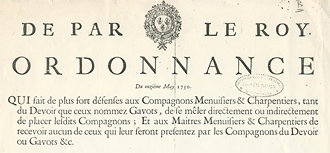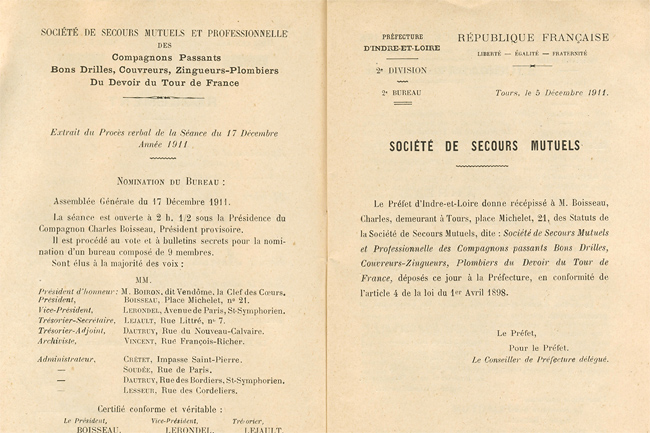Tolerated associations
It should also be added – and this is an important point with regard to their origins – that guilds were constantly forbidden under the Ancien Régime and continued to be so until the mid-19th century. There were numerous reasons for this. Known for their turbulent behaviour, guild members were frequently wanted by the law owing to their determination to ensure monopoly of employment opportunities in certain cities; their independent attitudes towards employers (their so-called “Masters”) also showed a resolve to be free to leave whenever they liked. They were also pursued, for their collective attempts to fix wages or obtain other advantages, or for preventing non-guild members from obtaining work freely. In addition, rivalries among societies of the same trade but with different rites, rejection of independent workers, and demands that employers found intolerable resulted in brawls and the expulsion of workers from a city; such actions also led to competition, dismissals, the closing of workshops, and workers’ strikes, compromising public order and upsetting relations between workers and employers.

In the 17th century, guilds were also attacked by the Church. Ecclesiastical authorities often denounced them for their “impious, sacrilegious and superstitious” practices because their initiation rites, although inspired by Catholic liturgy, were seen as parodies of Christian ritual.
In practice, however, guilds were tolerated. On the one hand, neither the police, courts and Church nor the employers were able to keep them from forming and, on the other hand – their excesses notwithstanding – the guilds provided good workers and saw it as their mission to educate hundreds of young men who would have been far more dangerous to society without such training. The authorities could keep a close eye on the guilds and limit their more violent forms of behaviour, but were incapable of forbidding them altogether.
This summary of guild life as it was up until the mid 19th century, and often even later, should make clear that guilds had no legal status and that active membership entailed a relatively short period of a man’s life (generally, less than ten years and sometimes only two). This means that traces of guild life are very rare, which in turn is a cause of despair for genealogists!

